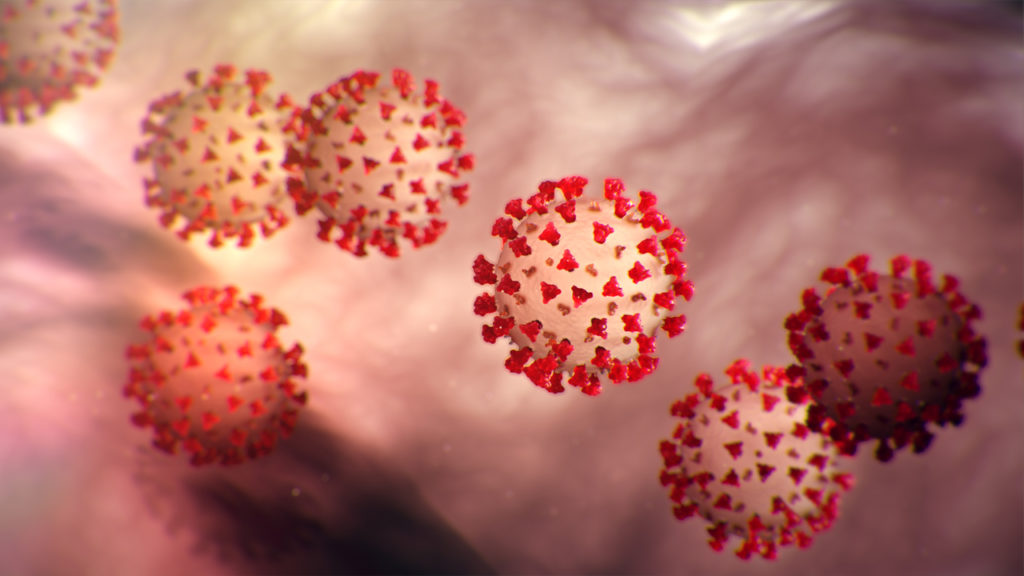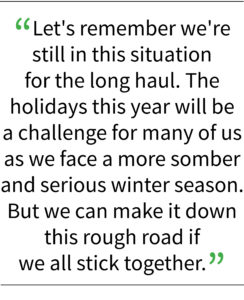The rising number of COVID-19 cases in South Valley serves as a wake-up call

Coronavirus photo courtesy CDC
Editorial is the opinion of Morgan Hill Life
The statistics are sobering. It’s important that we face the coronavirus facts and figures. And it’s even more important that we don’t forget that the growing death toll numbers are not just statistics. They represent people whose lives have been tragically cut short — including people here in the South Valley.
In mid-October, we learned at least 75 residents of the Gilroy Healthcare and Rehabilitation Center have been infected with COVID-19. Twelve of them died. Of staff members at the facility, 54 tested positive for the virus.
 The rising number of cases in South Valley serves as a wake-up call. More than three out of every 100 Gilroyans, 1,671 as of early November have been confirmed to have had the coronavirus. This is by far the largest number in Santa Clara County. Morgan Hill (656 people) and San Jose (15,609 people) come in second with about 1.5 percent of their population infected. The real figures are almost certainly higher as these are only the cases that have been reported to the county’s Public Health Department.
The rising number of cases in South Valley serves as a wake-up call. More than three out of every 100 Gilroyans, 1,671 as of early November have been confirmed to have had the coronavirus. This is by far the largest number in Santa Clara County. Morgan Hill (656 people) and San Jose (15,609 people) come in second with about 1.5 percent of their population infected. The real figures are almost certainly higher as these are only the cases that have been reported to the county’s Public Health Department.
The 2020 holiday season might be one of the bleakest experienced by many Americans. With colder weather confining people indoors, public health experts say we might see as many as 3,000 deaths a day in the U.S. during the month of December.
The “darkest part of the pandemic” will occur in the next 12 weeks, said Michael Osterholm, an American epidemiologist and director of the Center for Infectious Disease Research and Policy at the University of Minnesota, in a PBS News interview in late October.
One projection by the Institute for Health Metrics and Evaluation warns that with current interventions the pandemic’s death toll in America will surpass 410,000 by New Year’s Day. If we take the “herd immunity” approach and have no interventions, the death toll will reach at least 620,000 by Jan. 1
 This crisis is a bleak one for our nation. Consider three other periods of significant deaths in America’s history. World War II accounted for a total of 405,399 American deaths, with 291,557 of those in combat. The Civil War’s death toll is estimated to be about 655,000, with 214,938 people dying in combat. The Spanish Flu that ran its course during two years from 1918 to 1920 and resulted in at least 50 million deaths worldwide, about 675,000 occurring in the United States.
This crisis is a bleak one for our nation. Consider three other periods of significant deaths in America’s history. World War II accounted for a total of 405,399 American deaths, with 291,557 of those in combat. The Civil War’s death toll is estimated to be about 655,000, with 214,938 people dying in combat. The Spanish Flu that ran its course during two years from 1918 to 1920 and resulted in at least 50 million deaths worldwide, about 675,000 occurring in the United States.
The pandemic is well on its way to surpassing in the number of deaths in wars and previous health crises in our nation’s history. As the COVID-19 death toll continues to grow, we might see more than 700,000 American lives lost by the end of next year.
Despite the dangers, we’re now seeing a perfect storm brewing of the potential for the contagion to spread far more rapidly in the coming months. A growing number of people feel “pandemic fatigue.” Many have stopped being diligent in protecting themselves and others through basic but effective actions such as wearing masks, washing hands, and social distancing. An example of this fatigue is a private house party held Oct. 16 that brought together about 200 students from Christopher High School and Gilroy High School. One of the attendees tested positive for COVID-19 a few days later.
A growing segment of the population is also filled with pandemic anger. They deny the public health crisis is real. Despite the science, some people believe COVID-19 is a hoax that is politically motivated.
Scientists are working on a vaccine that will help in the endeavor to end the pandemic. Some experts say it might not be until a year from now when a vaccine will be approved and can start to have a meaningful impact on the population. It will also take time and billions of dollars to ramp up production and distribution.
The winter holidays are a time of festive gatherings of friends and family. People travel long distances to be with loved ones. It’s going to be hard emotionally on many of us to have to restrict our attendance at these parties, meals and other events. But in the year of COVID, the stakes are high.
 Across America, young adults who might not exhibit symptoms will take home the virus to mom and dad, grandparents, aunts and uncles — and some of those family members will be dead a few weeks later.
Across America, young adults who might not exhibit symptoms will take home the virus to mom and dad, grandparents, aunts and uncles — and some of those family members will be dead a few weeks later.
Let’s remember we’re still in this situation for the long haul. The holidays this year will be a challenge for many of us as we face a more somber and serious winter season. But we can make it down this rough road if we all stick together.
Right now, the moment has come for true leadership. We need our officials, men and women on both sides of the political aisle, to set aside their ideological differences and remind us that we Americans are at our best when we choose to stop fighting and start uniting as a country.






